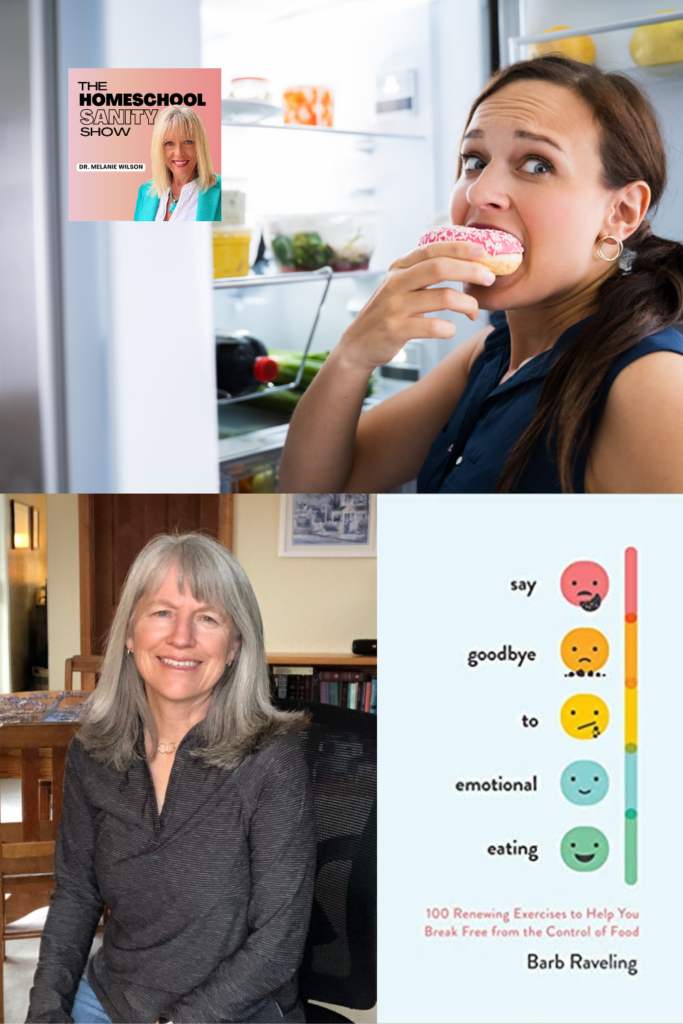
The Homeschool Sanity Show
Melanie Wilson, PhD
Your prescription for happier, healthier homeschooling with Christian psychologist and veteran homeschooling mother of six, Dr. Melanie Wilson, who interviews experts on the issues that drive you crazy.
- 15 minutes 10 secondsHow To Get Everything Done And Still Have Time To Play

Hey, homeschoolers! I recently read Mark Forster’s book How to Get Everything Done and Still Have Time to Play and I absolutely loved it. It’s been another of his books that has been life-changing for me. In this episode, I want to share principles from the book that can help you accomplish your homeschool and other goals this year and have plenty of free time too.
Watch on YouTubeSponsor
NOW Programs for students with special needs.
Defining Everything
How can we possibly get everything done? We can’t. Mr. Forster is very clear that by everything, he means everything we have decided we can and must do. Most of us are trying to do way too much–too many curricula, too many activities, even too many fun things. Until we limit the number of tasks and projects and commitments we take on, we will continue to struggle.
With that caveat out of the way, let’s talk about the struggle to get everything done. I would say that all my life I have had the same issue: I do a good job accomplishing a few top priorities, but everything else seems to get put on the back burner until it becomes a crisis. For example, when I create a task plan for the week, quarter, or year, writing curriculum like Training Aliens or preparing for a Great Homeschool Convention is the top priority. Publishing this podcast is the next highest priority. But what about social media? That gets pushed aside along with website changes and home projects and I don’t even want to talk about taxes! I have a feeling you can relate.
Approaches for Getting Everything Done
For you, maybe it’s math and English that are prioritized, meaning that science experiments, foreign language, or art get put off.
I’ve shared before about loop scheduling being a great option for this. You have a day or a time block that you assign two or more activities to. Then you loop or rotate through them in order. If last time you did a science experiment, then today you’d do foreign language.
Theme days are another way of dealing with these lower priorities. If you never get around to decluttering your art supplies, you might dedicate Saturdays to decluttering. Or you dedicate the last day of the month to deep cleaning.
These approaches have worked for me for a time. But when I missed enough of my looping or theme days, I would usually determine that I needed to give up the activity altogether and focus on my top priorities. The negative cycle would begin again.
Enter Mark’s book, which sets the stage with a fairy tale. Story-based inspiration? I’m here for it. This fairy tale has the hero, Hans, seeking wisdom for getting things done so he can focus on his top priority–winning the princess’s hand in marriage. I found myself relating to Hans as he tried many recommended approaches to getting things done. They worked for a while and then led to the same problem of lower priority tasks becoming a crisis. Poor Hans struggled to be successful AND win the princess.
The Get Everything Done Approach
Enter Mark Forster as our wise guide. He suggests an approach that reminds me of what I had recommended years ago in a blog post I called How to Homeschool in an Hour a Day.
The idea is that you make a list of the top projects or life areas that you want to give attention to. This should not exceed 10 areas or projects. Homeschoolers can include the subject areas you want to cover in your day. But you would also include a home category with things like organizing, and hobbies you want to make take time for. Those of you who want to start a business would list a project for it as well.
My initial list included Writing Training Aliens Curriculum, Podcast publishing, Business Administration, Other Work Projects, and Social Media. I had a home and family category and a personal one. Before beginning to use your list for the day, Mark recommends having a task or checklist that you want to accomplish for each project or area. I missed that recommendation when I began using the approach, however.
Once you have your list of areas or projects written, you will write the number 5 next to each. You will then set a timer for 5 minutes and dedicate that time to the first area on your list. Mark mentions that you may be using that first 5 minutes to clarify your plan for that project. I set a timer and looked over my notes for writing a Training Aliens lesson. When the timer goes off, you cross off the number 5 and write the number 10 next to it. You will then reset the timer and proceed to work for 5 minutes on the next area on your list.
When you have dedicated 5 minutes to each area on your list, you will go back to the top and will work for 10 minutes on each area. When you have finished what you want to do for that area, Mark recommends writing a 5 next to that area. If you still have work to accomplish, you will increase the time by 5 minutes for each pass you make until you hit 40 minutes. After working for 30 minutes total (and not after finishing a task), Mark tells us to stop what we’re doing and take a 5 minute break.
This may sound confusing, but the bottom line is that we do a short burst of work on multiple areas throughout the day, adding 5 minutes to the time we work on each pass through.
The advantages of this approach are:
-
- Resistance is minimized because we only have to do 5 minutes on a project to start. This is especially powerful if we have been putting off working on something.
-
- Every area of our homeschool and lives is given at least some attention during the day. The quick shifts to new activities keep our motivation high as opposed to having large time blocks on a schedule.
-
- We take advantage of the End Effect. By stopping when the timer goes off and not when we have finished a task, we feel the natural pull to return to it. When we do return to it, our resistance is further minimized because we feel the advantage of having already started it, even if for only a few minutes.
-
- This approach is effective when dealing with interruptions. If you’re interrupted for a long period, at least you’ve already accomplished something in multiple areas. If you’re interrupted for a short time, you simply return to the list where you left off.
One of the things that makes this approach so powerful is its adaptability. Mark gives many variations of the approach, using a smaller number of areas and different timing options. There isn’t a wrong way to do it.
Here is what I learned using this approach.
-
- First, I needed to return to using a focused time block for writing curriculum. Curriculum writing is still a top priority and I don’t struggle to dedicate a couple of morning hours to it. I decided that I wouldn’t use the Get Everything Done approach until I had finished writing a lesson. There may be areas of your homeschool that you don’t want to change. I likely wouldn’t include our Bible time or our read aloud time in this process because motivation wasn’t an issue for these.
-
- Second, I realized that my resistance to some other areas wasn’t so high that I needed a 5-minute burst to start. I had tried beginning the day by starting where I left off the previous day with 20-minute bursts. I didn’t like that, so I tried 10-20-30 minute daily bursts instead and I liked it a lot. I felt I was done with some areas after just two bursts and could limit the areas I was spending 30 minutes on. I recommend experimenting with different times for you and getting feedback from the kids.
-
- Third, I realized that I wanted to put the areas in a different order based on my current routine and also giving me a break. I am doing physical therapy exercises for shoulder pain and realized that doing those after a couple of computer-based projects made sense. I positioned the Personal category such that it would be another break for me. I wouldn’t have to take separate breaks after every 30 minutes of work.
-
- Fourth, I discovered by accident that I loved choosing the activity as I worked instead of preplanning them. Preplanning the activities could become a schedule that I might rebel against after a time. Instead, I have a separate list of potential tasks in my task manager for each area. For example, when the Podcast area is up, I might decide to invite someone who’s been on my wish list to be a guest. For the Home and Personal areas, I allow myself to work without a list. I ask myself what I feel like doing. It might be cleaning out my bathroom cabinet for Home and reading a book for Personal. I also counted interruptions as bursts in that area. Service calls were marked as a Home burst, even though it was out of order.
-
- Finally, this approach has helped break through my procrastination and has me feeling on top of everything I want to do. That’s remarkable. I do have a stopping time in the evening. But in the future, I may try continuing to use bursts with a limited or different list. It could help me engage in more productive pursuits than screen time in the evenings.
As you consider trying this, think about using it for skill practice for you or your kids. Practice piano or foreign language for 5 minutes and then 10 minutes until you’ve met the daily goal. This approach would also work beautifully for exercise. I am not using it for that purpose because it’s already a scheduled habit for me. But it would be a relatively painless way of building the habit.
Conclusion
How to Get Everything Done & Still Have Time to Play is a quick and engaging read. I highly recommend it and giving it a try. It would be an engaging experiment for kids and teens, and may be especially useful for those with ADD. I wrote about many approaches like this in my book A Year of Living Productively. Thanks again to Now Programs for sponsoring the podcast.
Have a happy homeschool week!

The post How To Get Everything Done And Still Have Time To Play appeared first on Ultimate Homeschool Podcast Network.
21 January 2025, 11:00 am -
- 31 minutes 55 secondsHow To Teach Leadership
 Hey, homeschoolers! I used to be of the mind that leaders were born, not made. What I mean is, I thought you needed to be a Type A extrovert to be a leader. There didn’t seem to be much point to teaching my introverted kids how to lead.
Hey, homeschoolers! I used to be of the mind that leaders were born, not made. What I mean is, I thought you needed to be a Type A extrovert to be a leader. There didn’t seem to be much point to teaching my introverted kids how to lead.But my opinion has changed as I’ve watched my introverted, Type B child become a leader. I’ve also changed my thinking after interviewing Kerry Beck for the podcast. Her definition of leadership motivates us to teach every child these skills.
I’m thrilled to be joining Kerry for the Raising Leaders, Not Followers conference starting February 25th. You can sign up now for free if you know you’ll be able to watch live or register for the VIP option at homeschoolsanity.com/leaders. I’ll be sharing how to help your child make and keep friends. I would love to have you join me.
Kerry Beck helps you get past the perfect Instagram image & move on to real-life ways to raise your kids to lead, instead of follow. She offers practical tips to encourage your kids to love learning, think critically and influence those around them as adults. She inspires moms with her personal & spiritual stories of moving from overwhelmed to peace & resting in God.
Kerry homeschooled her three (now adult) children for 10 years. She has a free homeschooling ebook for you at HowToHomeschoolMyChild.com.
Watch on YouTubeSponsor
NOW Programs provides services to benefit special-needs learners.
Leadership Resources
Homeschool Coffee Break Podcast: https://howtohomeschoolmychild.com/podcast2024/
Facebook https://www.facebook.com/groups/HowToHomeschoolMyChild
Instagram https://www.instagram.com/howtohomeschoolmychild/
YouTube https://www.youtube.com/channel/UCpuF_qVYrSVUUZrL8mWhYfA
Pinterest https://www.pinterest.com/howtohomeschool/
Leadership Summit http://homeschoolsanity.com/leaders
Have a happy homeschool week!

The post How To Teach Leadership appeared first on Ultimate Homeschool Podcast Network.
14 January 2025, 11:00 am - Special Replay: Organizing Challenges for the New Year
 Organizing is a popular goal for the new year. If you’re a homeschooler wanting to get organized, it can be hard to know where to start. Consider the six areas I share in this podcast episode.
Organizing is a popular goal for the new year. If you’re a homeschooler wanting to get organized, it can be hard to know where to start. Consider the six areas I share in this podcast episode.SPONSOR: NOW Programs
Have a child with learning challenges? NOW Programs offers help.
Want to read the podcast as a blog post? READ HERE or SUBSCRIBE ON ITUNES or ON STITCHER
Links
a comprehensive post about the best places buy/sell used curriculum
Konmari method for folding clothes
Tastefully Simple’s 30 day meal plan
Which area are you organizing first? Let’s chat about it on Facebook.
The post Special Replay: Organizing Challenges for the New Year appeared first on Ultimate Homeschool Podcast Network.
17 December 2024, 11:00 am - Special Replay: Redeeming Your Time: How To Make The Most Of Every Moment As A Homeschool Mom
 Hey, homeschoolers!
Hey, homeschoolers!I’m a time management/productivity enthusiast, which you know if you have my book, A Year of Living Productively. That book is the result of my experiments with more than 80 different productivity approaches. I did the reading and the experimenting to make the process of creating your own productivity formula faster. What I’ve discovered about has enabled me to write, speak, run a business, homeschool, maintain relationships, keep a home, and enjoy hobbies. But I’m never done wanting to improve.
Sponsor: NOW Programs
If you have a special-needs learner, check out NOW Programs!
Introduction
Every season of our lives presents new challenges for using our time. I have just two high school students at home now and they both work. I’m done teaching public speaking at our local homeschool academy. Now I want to provide YouTube videos to help homeschooling parents. So it’s a good time for me to reevaluate how I’m doing things.
That reevaluation led me to read the book Redeeming Your Time by Jordan Raynor. Honestly, I was prepared to be disappointed. Most time management books are basic. You know: Your time is valuable. Have a morning routine. Plan your day. Christian books about time typically emphasize spending time in prayer about your priorities. These practices are so important, but they aren’t new to me after years of focus on productivity.
So I was surprised by Jordan’s book. I needed it. Maybe you do, too. So I’m going to share six lessons from Redeeming Your Time that will help you make the most of every moment as a homeschool mom.
#1 God will finish the work we leave unfinished
Too many time-management teachers imply that we can get it all done. Just say no to things, trim down your extracurricular activities, use practical curriculum and you’ll finish your homeschool plan early. Yeah, right!
This idea has left me feeling like a failure. Sometimes I give up. I quit putting effort into activities or I stop using the curriculum. Other times I try harder. I commit to getting up earlier, being firmer with my kids about meeting deadlines, or working faster through lessons. Because that’s a recipe for joy, right?
There are so many lessons and subjects I wanted to teach my kids before they went off to college but didn’t. I have honestly schemed about how I could talk them into doing the lessons when they’re home for college. “Hey, guys, let’s watch this amazing video together. Here’s a fantastic book that I’m going to read aloud to you.” Yeah, that won’t happen.
As a writer, I have so many ideas for books. I want to write them all! Truthfully, I’d like to write them all this year. But Jordan gently helped me see that I won’t write them all this year. I may not write them all in five years. I may not write them ever.
But it’s okay. God knows that we won’t get all the work done even if we’re still in denial about it. He will finish the work that He wants done. Our kids will learn the lessons they need to learn without us. Hard to believe, I know. They’ll hear a message in church, get it through experience, or will seek the knowledge themselves because we have taught them how to learn. I have seen this in my kids time and time again.
So, take a deep breath, and know that God will finish everything on your to-do list that He wants done, even if He uses someone else to do it.
#2 We aren’t obligated to be productive
Jordan didn’t put it quite this way. Instead, he said, “God loves us no matter how productive or unproductive we are in this life.” He isn’t sighing in disappointment when He sees me chatting with friends instead of teaching a lesson on research paper writing. He isn’t rolling His eyes when I’m looking at clothes on Pinterest instead of making a faith video to share on Instagram.
Jordan explains that no matter how much we accomplish, it isn’t possible for God to love us more. And no matter how much we mess up, it isn’t possible for God to love us less. He reminded me of a blog post I wrote years ago on obligation-based procrastination. We strong-types don’t like feeling like we have to do things. That’s why I never practiced piano when I had to practice for my teacher each week. As soon as my parents gave me permission to quit, I began playing an hour a day–simply because I wanted to.
What this means is that God doesn’t require us to check off a long list of tasks. We aren’t required to do them to earn His love. Suddenly, we are free to do them simply because we want to.
What tasks can you let go of that God isn’t requiring you to do? Let them go and rediscover what you’re passionate about.
#3 Take time to think
When I had severe shoulder pain, sitting in our hot tub was one of the few things that gave me relief. But that time had an added benefit. I had nothing to do but think. I already knew what a blessing thinking time was for me. I love driving long distance alone. I talk to God, work through emotions, and come up with my best ideas. I had the idea for Grammar Galaxy while driving.
But I needed the reminder to take this time even when I’m at home. The popular practice of meditation is not what I’m talking about here. Secular meditation is chasing thoughts away by focusing on the breath or repeating a phrase. I think that’s the opposite of what we need to do. We need to let the thoughts come so we can acknowledge them and learn from them.
Jordan makes the point that we have so little quiet time to think that the thoughts come in a rush when we step into the shower, are having a conversation, or try to go to sleep at night. We have blocked them by reading, listening, and watching constantly.
The first time I practiced this after reading Jordan’s book, the answer to a question I had about how to spend my time came to me so clearly that I was dumbfounded.
After having time to read God’s Word and praying, sit and think. Notice what comes to mind without trying to block the thoughts.
#4 You don’t need to know
I told you about the lessons I learned doing a social-media fast. So I was surprised to learn more on this topic.
Jordan called me out on some of my reading habits. He writes, “We love being the first to know something…There is ego in trying to stay up on everything…in trying to appear the most informed person in the room.” Ugh. Then he quotes Jen Wilkin: “Our insatiable desire for information is a clear sign that we covet the divine omniscience.” In other words, she’s saying I’m trying to be God. If I were God, I would need to know all the things.
After reading the book, I moved some things out of my inbox. What’s funny is that my husband and friends are always repeating what I read anyway. But I apparently really like being in the know and I’ve started reading them again. Preparing this podcast is a good reminder to me that I don’t need to know.
Jordan says that we weren’t created to take in information like it’s coming out of a firehouse. I remember getting a 75-page homeschool newsletter in my early homeschooling days. The number of decisions I had to make about homeschool activities each month was so overwhelming that I stopped reading it. Instead, I told my friends to tell me about anything I shouldn’t miss.
If you’re drowning in information you don’t need, consider having your friends and family keep you posted about what the critical and letting the rest go.
#5 Choose goals for your priority roles
Jordan’s roles as husband, father, and entrepreneur guide his goals. I believe in the priority of marriage and talk about it. But I realized after reading Jordan’s marriage goals that I don’t have any goals related to my marriage. That’s in part because we have a healthy marriage. My business is also doing well. Yet I have many goals for it. There is clearly a mismatch between my marriage priority and my goals.
Jordan has date nights as a goal. I don’t need that. My husband and I both work from home, go out on dates regularly, and spend focused time together morning and evening. Then I recalled what Sandy had said about doing good to her husband all the days of her life. I shared this in a previous episode that I’ll link in the show notes. Now I had a goal. Each day I would look for a day to do my husband good.
The first day my husband was asking me what I would make for dinner and he suggested pork chops. I wrinkled my nose. Pork chops are just okay for me. Then I remembered the goal. Making pork chops would be the good I would do him. But that’s it. That’s all he gets. I’m kidding!
What are your three top roles in life? Choose a goal that matches each role.
#6 Manage interruptions in batches
Most people check their email and text messages many times a day. Jordan’s metaphor shows us how ridiculous this is. He writes, “I want you to imagine something. Instead of delivering mail to your home once a day, the mailman has started making deliveries one hundred times a day. And he no longer stays at the curb. With each delivery, he rings your doorbell and you get up from whatever you’re doing, open the door, take the piece of mail, and open it…That would be insane, right?”
Yep, insane. I realized that although I had my phone on silent while I was writing, I kept being interrupted by the tap of my Apple watch. A friend sent a news article for me to read. Even when I didn’t stop to read it, I was distracted. It took time for me to focus on my writing again.
You may not have a problem with email or messaging but with children interrupting you. You’re tutoring one child and two more come to you asking for help.
After reading the book, I started using the Focus setting on my phone. I couldn’t believe the difference it made to get no digital interruptions during my writing. My next step is to put a “recording” sign on my door so my family knows not to interrupt my podcast and YouTube sessions.
Consider set times for checking your email, messages, and your kids’ schoolwork. Take advantage of apps that will block non-emergency interruptions.
Conclusion
There is so much more to Redeeming Your Time. He is writing to a business audience primarily, but it’s a worthy read for a homeschool mom. Let me know what you think of it and your results with the tips I shared.
Join me next time as we discuss how to homeschool if your child won’t listen.
Have a happy homeschool week!

The post Special Replay: Redeeming Your Time: How To Make The Most Of Every Moment As A Homeschool Mom appeared first on Ultimate Homeschool Podcast Network.
10 December 2024, 11:00 am - Special Replay: Say Goodbye To Emotional Eating With Barb Raveling
 Do you ever eat because you’re bored, anxious, or excited? The is the episode where we learn how to say goodbye to emotional eating so we can stay focused on homeschooling.
Do you ever eat because you’re bored, anxious, or excited? The is the episode where we learn how to say goodbye to emotional eating so we can stay focused on homeschooling.Hey, homeschoolers! The problem with emotional eating for homeschooling parents is two-fold. We hate the consequences for ourselves and we hate even more the example it sets for our kids. But how can we get past it?
Sponsor: NOW Programs
http://nowprograms.com for your special-needs learners
Podcast Guest: Barb Raveling
My guest for this episode will help us! Barb Raveling has joined me on the show before. I’ll put links in the show notes. She is a retired homeschool mom, now a prolific Christian author you can learn more about at BarbRaveling.com. She has a soon-to-be-released book on this topic called Say Goodbye to Emotional Eating.
Barb and I discussed:
- the definition of emotional eating and its effects
- strategies for overcoming emotional eating
- whether it’s possible to really break free from emotional eating or whether it’s something people will struggle with for the rest of their lives
Barb has shared on previous episodes you can listen to:
To preorder Barb’s book and claim valuable bonuses, go to SayGoodbyeToEmotionalEating.com.
Have a happy homeschool week!

The post Special Replay: Say Goodbye To Emotional Eating With Barb Raveling appeared first on Ultimate Homeschool Podcast Network.
3 December 2024, 11:00 am - 14 minutes 23 secondsHow To Have Happy Holidays As A Homeschool Mom
 Hey, homeschoolers! We wish each other happy holidays, but sometimes it’s hard to be happy through the holidays. I have three reasons it can be hard that lead to three steps we can take toward happier holidays.
Hey, homeschoolers! We wish each other happy holidays, but sometimes it’s hard to be happy through the holidays. I have three reasons it can be hard that lead to three steps we can take toward happier holidays.But first I’d like to thank our sponsor for the podcast: NOW Programs.
Sponsor: NOW Programs
If you’re homeschooling a student with special needs, check out http://NOWPrograms.com
Listen to the podcastDeal with Disappointment
The first reason George and you and I find it hard to be happy through the holidays is disappointment. Maybe your homeschool year hasn’t been going the way you hoped. The kids don’t love their classes or curriculum. You’re already behind schedule. A learning challenge has been indentified. Maybe your finances are stretched even tighter than you thought. You’ve been ill. Or maybe you’ve experienced a loss. A loved one won’t be joining you for the holidays. A relationship has ended. Or you or your spouse lost a job. George experienced many disappointments like these. He lost his father, a chance to go to college, and the income he hoped for.
Thinking about disappointments is depressing, so we may try to avoid thinking about them. Yet they intrude upon our happiness anyway.
That leads me to the first step we can take to be happy through the holidays: Deal with the disappointment. Instead of eating or doom scrolling over it, acknowledge it. You’re disappointed. You hoped and prayed that things would be different, better. But they’re not.
The quickest way out of disappointment depression is through, not around. Sit by yourself with no noise and no distractions. Allow yourself to think about the disappointment and feel the feelings. If you cry, you cry. If you get mad, you get mad. Give yourself as much time as you need to think and pray about it. Journaling works too. Write out everything you’re thinking and feeling, without worrying about anyone else seeing it. When you’re done writing, you can delete it, destroy it, or password protect it.
When you’ve had the time to process it privately, you can then deal with the disappointment by talking to someone you trust who isn’t a part of the disappointment. You don’t want to worry about hurting someone’s feelings as you share your own emotions, unless you’re trying to resolve a conflict. Sometimes you’ll want to make it clear to the listener that you’re not asking them to fix the disappointment for you, just to listen. Talking it out can make a huge difference in your happiness.
Invest in People
The second cause of unhappiness at the holidays is people. People are hard. They disappoint us. We’ve already covered that. People also annoy us. Maybe we expect the bad behavior, so it’s not as disappointing as it is frustrating. We may struggle to know what to say or do when they’re around. Maybe we feel bad about something we’ve said or done in the past, so we have a serving of guilt to go along with our frustration. George had a challenging relationship with Mr. Potter, who was a constant thorn in his side. He also had to deal with selfish bank patrons and an irresponsible uncle.
While we sometimes avoid thinking about disappointments, we will often ruminate about people problems. We replay the negative things people said and did in the past over and over. We fantasize about what we should have said or done in response. And then we worry about what awful things people will do in the future. George Bailey’s ruminations led him to complete despair.
What should we do instead of ruminating about people? Invest in them. The first time I bought a stock, I followed it closely and my mood was up and down with its price. I tried to time the market and cash out at just the right time. If you know anything about stocks, you know that behavior is laughable. Yet it is what we often do in volatile relationships. We say or do something, hoping to see an immediate payoff. We watch the person like a hawk for signs that they are responding to our investment. That’s not what serious investors do. They’re in it long-term. They keep reinvesting and they don’t watch the price. They believe that what they’re giving will pay off. Of course there are times when it makes sense to sell. But if you value the relationship, you’ll want to keep investing for the long haul without worrying if you don’t see the payoff from each interaction.
George Bailey invested in people. He believed in people. He gave them a chance. He sacrificed so they could have full lives. But because he hadn’t seen the value he’d accummulated, he was ready to cash out completely.
Investing in people means that we continue being kind, loving them, and sharing the reason for the hope that we have. Investing in people means that we help people like themselves when they’re with us. We compliment them and express interest in them. We offer them the gift of hospitality and make them feel welcome. We refuse to stop believing in them.
Express Gratitude
The third reason it can be challenging to be happy during the holidays is our experience of injustice. We’re doing everything for our family, but the kids keep complaining. We are the ones hosting or helping or changing our schedule again to accommodate everyone else. We’ve been doing the right things for years, but we aren’t as successful or wealthy as people we know who do the wrong things. George felt that way. He did everything right but was wronged. He expected a punishment he didn’t deserve.
Our experience of injustice can lead to self-righteousness. Self-righteous people are not happy. Instead of focusing on our experience of injustice, we want to express our gratitude. The gift of children or grandchildren to teach is so precious. The fact that we can legally homeschool them is a gift. The extra time we have to be with our children and learn alongside them is worth more than the extra income we could have were we not homeschooling. And having to deal with imperfect people is a blessing compared to being alone.
Gratitude isn’t just something we should express because it’s the right thing to do to honor God. It’s a focus that can make us happier immediately. We can consider every good and perfect gift we have now. That’s the easiest gratitude list to make. But what about gratitude for gifts we experienced in the past? We can express gratitude for the good times we had in relationships and seasons that have ended. I’m thankful that I had family members and friends that were so wonderful that I miss them now that they’ve passed. We can also express gratitude for the good we know God will work together in the future. We don’t know that our circumstances will change the way we want them to in this life, but we know we can look forward to God’s perfect plan and presence in eternity. If you need some encouragement on that topic, I suggest listening to the episode I recorded with Jordan Raynor. We can express gratitude daily in prayer, in writing, and in relationships.
George was focused on the injustice he experienced until his eyes were opened to the many gifts he had to be grateful for. He wanted to go back to the old life he had so bitterly complained about.
Conclusion
The three steps to being happy through the holidays we’ve covered today are dealing with disappointent, investing in people, and expressing gratitude. I recently learned that Jimmy Stewart was in a very similar situation to George Bailey. He was demoralized after serving in the war and was ready to give up acting to run his family’s hardware store when director Frank Capra offered him the role of George Bailey. Although the film wasn’t a box office hit and it didn’t win any of the academy awards it was nominated for, it has become one of the most loved films of all time. Referring to director Capra, Jimmy Steward said, “He not only saved my career; he saved my life.”
I’m so grateful to God for the same reason. He saved my life and gave me the most fulfilling career–first homeschooling my kids and then writing and speaking for homeschool families. I’m also grateful for people like you who listen and read the materials I write. In gratitude, I am offering 20% all materials excluding bundles at FunToLearnBooks.com/shop with code BLACKFRI through Cyber Monday. My prayer is that you will be blessed with happy holidays. And if you haven’t watched It’s a Wonderful Life, I encourage you to watch it soon.
Have a happy homeschool week!

The post How To Have Happy Holidays As A Homeschool Mom appeared first on Ultimate Homeschool Podcast Network.
26 November 2024, 11:00 am - 47 minutes 11 secondsCombatting Family Consumerism
Watch on YouTube Hey, homeschoolers! Pushing back against a consumerist culture is an issue all year but is on our minds even more during the holidays. My guest today has experience in teaching kids to combat consumerism with good old-fashioned hard work. I’ll introduce him after this message from our sponsor. Now programs.
Hey, homeschoolers! Pushing back against a consumerist culture is an issue all year but is on our minds even more during the holidays. My guest today has experience in teaching kids to combat consumerism with good old-fashioned hard work. I’ll introduce him after this message from our sponsor. Now programs.Podcast Sponsor: NOW Programs
Podcast Guest: Keith Phillips
Keith Phillips is a former US Army helicopter pilot who, along with his wife Becky and their six children, is dedicated to building productive families and enduring Christian legacies. He introduces BUNKEYS, small DIY linked log cabin kits to America, promoting family unity through shared meaningful work. Keith believes in the power of family and community with work as the cornerstone and advocates for living a life of biblical producerism. I so enjoyed our conversation.
Takeaways
-
- Consumerism thrives on neglecting our inherent call to produce.
-
- Family work fosters cooperation and contributes to family unity.
-
- Saying no to passive entertainment encourages creativity in children.
-
- Boredom can lead to innovative play and activities.
-
- Fear of missing out drives consumerist behavior in children.
-
- Creating space for meaningful activities is essential for family bonding.
-
- Overcoming societal pressure is crucial for resisting consumerism.
-
- Hard work can replace addictive behaviors and foster fulfillment.
-
- Engaging in family projects teaches valuable life skills.
-
- Reading together strengthens family connections and shared experiences.
Resources
Keith’s Substack article on consumerism
Spotify
https://open.spotify.com/show/5gBadT2mixwLThvz8GqI7z
Apple
https://podcasts.apple.com/us/podcast/the-stay-at-work-home/id1762916088
YouTube
https://www.youtube.com/@TheStayatWorkHome?sub_confirmation=1
Instagram
https://www.instagram.com/stayatworkhome
Facebook
https://www.facebook.com/stayatworkhome
Read Aloud List
https://stay-at-work-home.ck.page/b3004580e4/index.js
See also my interview with Joshua Becker

The post Combatting Family Consumerism appeared first on Ultimate Homeschool Podcast Network.
19 November 2024, 11:00 am -
- 30 minutes 45 secondsHow To Homeschool Through The Holidays
Watch on YouTube Hey, homeschoolers! How will you homeschool through the holiday season? There are many approaches that can work for you, but you’re most likely to feel good about the season when you’re intentional about it. I invited guest Katie Trent back to share with us some ideas for adjusting our homeschooling during the holidays. I also asked her about her new book that is a must-add-to-cart title.
Hey, homeschoolers! How will you homeschool through the holiday season? There are many approaches that can work for you, but you’re most likely to feel good about the season when you’re intentional about it. I invited guest Katie Trent back to share with us some ideas for adjusting our homeschooling during the holidays. I also asked her about her new book that is a must-add-to-cart title.Before I get to our interview, I want to thank NOW Programs for sponsoring the podcast.
Sponsor: NOW Programs
Resources
How to Homeschool Through a Move with Katie J Trent
Have a happy homeschool week!

The post How To Homeschool Through The Holidays appeared first on Ultimate Homeschool Podcast Network.
12 November 2024, 11:00 am - 26 minutes 32 secondsTeaching Reading The Active Way

Hey, homeschoolers! When I began homeschooling, I thought I would have to teach reading on the couch. That’s a lot more comfortable for kids than at desks, but I didn’t know that I could do better–especially for my boys. Before I introduce my guest, I want to share this message from our sponsor, NOW Programs.
Sponsor: NOW Programs
Podcast Guest: Stefanie Hohl
Stefanie Hohl is an experienced educator specializing in early literacy and movement-based learning. She is passionate about finding innovative ways to save parents’ sanity while still engaging young learners. She developed a fun and effective program called ABC See, Hear, Do. This program is designed to help children develop essential reading skills through a multi-sensory approach that incorporates visual, auditory, and kinesthetic learning styles.
I really enjoyed hearing her ideas, and I know you will too.
Watch on YouTubeResources
Stefanie on Facebook, Instagram
Have a happy homeschool week!

The post Teaching Reading The Active Way appeared first on Ultimate Homeschool Podcast Network.
5 November 2024, 11:00 am - 26 minutes 25 secondsFinding Homeschool Rest In The Gospel
Watch on YouTube Hey, homeschoolers! When it comes to seeking a more relaxed homeschool, we can find numerous tips for adjusting our schedule and curriculum. But there is only one source for true rest. My guest today is going to share how we can find it.
Hey, homeschoolers! When it comes to seeking a more relaxed homeschool, we can find numerous tips for adjusting our schedule and curriculum. But there is only one source for true rest. My guest today is going to share how we can find it.Before I introduce her, I’d like to thank our sponsor: CTC Math.

Sponsor: CTC Math
Are you looking for a new Math Curriculum?
CTCMath specializes in providing online video tutorials that take a multi-sensory approach to learning. Favorably reviewed in Cathy Duffy’s 102 Top Picks and The Old Schoolhouse Crew Review, the lessons are short and concise to help your children break down concepts and appreciate math in a whole new way!
The lessons are taught the traditional way, not to a “test”.
Each one of the video tutorials is taught by an internationally acclaimed teacher, Pat Murray, who is renowned for teaching math concepts in a simple, easy-to-understand way (and in only a few minutes at a time). Using a multi-sensory approach having the combination of effective graphics and animation synchronized with the voice of a friendly teacher together with practical assessment. This three-pronged attack makes learning so much easier and more effective. Even students who struggled with math are getting fantastic results! And ones who were doing OK before are now doing brilliantly.
Visit c-t-c-math.com today to start your free trial.
Guest: Amy Sloan
My guest for this episode is Amy Sloan. Amy is the host of the long-running Humility and Doxology podcast, where she shares her passion for classical homeschooling, family discipleship, and joyful, restful learning. As a second-generation homeschooler, Amy brings years of experience not only as a student but now as a mother of five, navigating the ever-evolving journey of home education.
Today, Amy will be sharing her insights on how we can find true rest in the gospel, especially in the midst of our busy lives. I know you’ll enjoy getting to know her as I did.
Takeaways
-
- Homeschooling can be a fulfilling yet challenging journey.
-
- Understanding our identity in Christ is crucial for homeschool moms.
-
- Our value is not based on our children’s accomplishments.
-
- God’s love for us is unconditional and eternal.
-
- We are called to respond to God’s love with obedience.
-
- Homeschooling should not be viewed as a vending machine for perfect outcomes.
-
- Family worship and devotions are foundational to a Christ-centered home.
-
- Humility is essential in recognizing our need for God’s grace.
-
- The Holy Spirit works in our children, not our efforts alone.
-
- Community and resources are vital for encouragement in homeschooling.
Resources
https://www.youtube.com/c/HumilityandDoxology
https://www.instagram.com/humilityanddoxology
Have a happy homeschool week!

The post Finding Homeschool Rest In The Gospel appeared first on Ultimate Homeschool Podcast Network.
29 October 2024, 10:00 am -
- 33 minutes 34 secondsWhat To Teach Kids About Heaven

Hey, homeschoolers! I was so excited about heaven as a little girl that I wasn’t afraid to die. My mother was freaked out and realized she needed to change her approach. What are you teaching your kids about heaven? As believers, we want what we teach to be biblical, but which aspects of heaven should we emphasize?
Watch on YouTubeI chatted about this topic with former guest Jordan Raynor, who has authored a new picture book for kids called The Royal in You. The YouTube version of our interview includes some beautiful artwork from the book. Before I share our discussion, I want to thank NOW Programs for sponsoring the podcast.
Sponsor: NOW Programs
Takeaways
Many Christians dread the thought of heaven due to misconceptions.
Cultural views of heaven often misrepresent biblical truths.
The new earth will be filled with the best things from our current world.
We will work and reign with Christ on the new earth.
Understanding our future in the new earth gives us hope today.
The Bible emphasizes a physical resurrection and renewed earth.
Work in the new earth will be fulfilling and joyful.
Parents can cultivate hope for eternity in their children.
Scripture provides clarity on the nature of heaven and the new earth.
Engaging activities can help children understand their faith better.Resources
Have a happy homeschool week!

The post What To Teach Kids About Heaven appeared first on Ultimate Homeschool Podcast Network.
22 October 2024, 10:00 am - More Episodes? Get the App
Your feedback is valuable to us. Should you encounter any bugs, glitches, lack of functionality or other problems, please email us on [email protected] or join Moon.FM Telegram Group where you can talk directly to the dev team who are happy to answer any queries.

 The Homeschool Solutions Show
The Homeschool Solutions Show
 The Homeschool Sisters Podcast
The Homeschool Sisters Podcast
 Savvy Homeschool Moms podcast
Savvy Homeschool Moms podcast
 101 Homeschool Ideas
101 Homeschool Ideas
 10 Minutes to a Better Homeschool
10 Minutes to a Better Homeschool